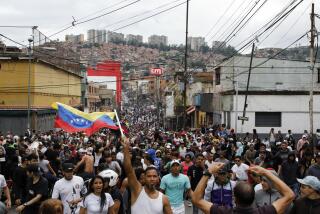Mood of Defiance Found in a Rural State
- Share via
MORELIA, Mexico — The line at the mountain polling station Wednesday looked traditional enough: Dark women wearing the black rebozo , the all-purpose shawl good for carrying babies and groceries alike, stood murmuring in small groups. Brawny men in flattened cowboy hats and ponchos shuffled their feet in silence.
It was election day in Michoacan, a rural Mexican state famed for colonial architecture, flavored ices and waves of emigrant workers traveling north to the United States.
But beneath the surface image of old Mexico was a new mood of defiance. Voters by the thousands were turning their backs on the Institutional Revolutionary Party, a political juggernaut that has ruled Mexico for 60 years.
In interviews from the town of Cheran to Morelia, the capital, voters in Michoacan agreed: The PRI, as the ruling party is called, is no longer the only political game in town.
And the trend is nationwide. The PRI presidential candidate, Carlos Salinas de Gortari, was the certain winner Wednesday, but his share of the vote was expected to be the lowest in the party’s history.
“There is a real need for change,” said Pedro Macias, a 50-year-old schoolteacher in the lumber town of Paracho, who voted against the PRI for the first time in the four elections of his adulthood. “The PRI has had control for a long time, but the problems of the country are mounting every day.”
The voters’ main complaint dealt with the lack of jobs and high prices. Even traditional PRI benefits, like instant public works and action to resolve some bureaucratic mix-up, were not enough for some voters.
Adelid Herrera, a mechanic, recalled a recent visit from a local government official to his run-down squatter neighborhood of El Realito outside Morelia, which is about 135 miles west of Mexico City.
“He told us that if we voted the right way, we could earn title to the land where our homes stand,” said Herrera, crossing his arms as he waited to vote. “I nodded. We all nodded. We’ll take the titles if he delivers them. But I’m not selling my vote.”
The immediate beneficiary of the voter rebellion in Michoacan appeared to be Cuauhtemoc Cardenas, a former PRI governor here who is challenging his old party. Cardenas is leading a leftist coalition. His promises of heavy government spending for social programs evidently eroded the PRI’s traditional hold on Mexico’s poor.
Michoacan, which has a population of 3 million and was once a staunch PRI state, may well favor Cardenas in this election.
The rightist candidacy of Manuel J. Clouthier, representing the National Action Party, has some strength among staunch Roman Catholics in northwest Michoacan.
Even PRI supporters in the state agreed that things had changed.
“It’s difficult combat here,” said mason Ricardo Munoz, who was waiting to vote in the poor Morelia neighborhood of Santiaguito. “There have never been so many forces in contention.”
In general, the voting went quietly. Voters displayed identification cards to polling officials, picked up ballots, marked the party emblem of their choice and deposited the slips in white translucent boxes.
Each voter then dipped a finger in indelible ink as a sign that he had voted. At many polls, small contingents of soldiers and police officers looked out for trouble.
The government and opposition parties alike said that voter turnout was unusually heavy.
“People hardly took interest in elections before,” commented Alejandra Carrasco, a PRI defector who voted for Cardenas. “But with the economy like it is, people need an outlet.”
The tranquil balloting erased fears that violence might follow the weekend shooting deaths in Mexico City of two aides of Cardenas. Cardenas called the shootings politically inspired.
One of the dead campaign officials, Francisco Xavier Ovando, was buried in Morelia on Tuesday, and the shootings seemed only to increase the defiant mood of anti-PRI voters.
“If it was meant to scare us, it won’t work,” said Armando Jimenez, a student and Clouthier supporter. “We are decided that the PRI must go.”
Scattered incidents of voting irregularities marred the otherwise routine balloting. In one town, opposition parties accused the PRI of stealing ballots and handing them out already marked. Many voters complained that they were not permitted to vote, even though their names appeared on the voter register. They said they never received their electoral credentials.
Opposition officials said they were waiting to see whether such problems amounted to important fraud before airing formal complaints.
More to Read
Sign up for Essential California
The most important California stories and recommendations in your inbox every morning.
You may occasionally receive promotional content from the Los Angeles Times.










